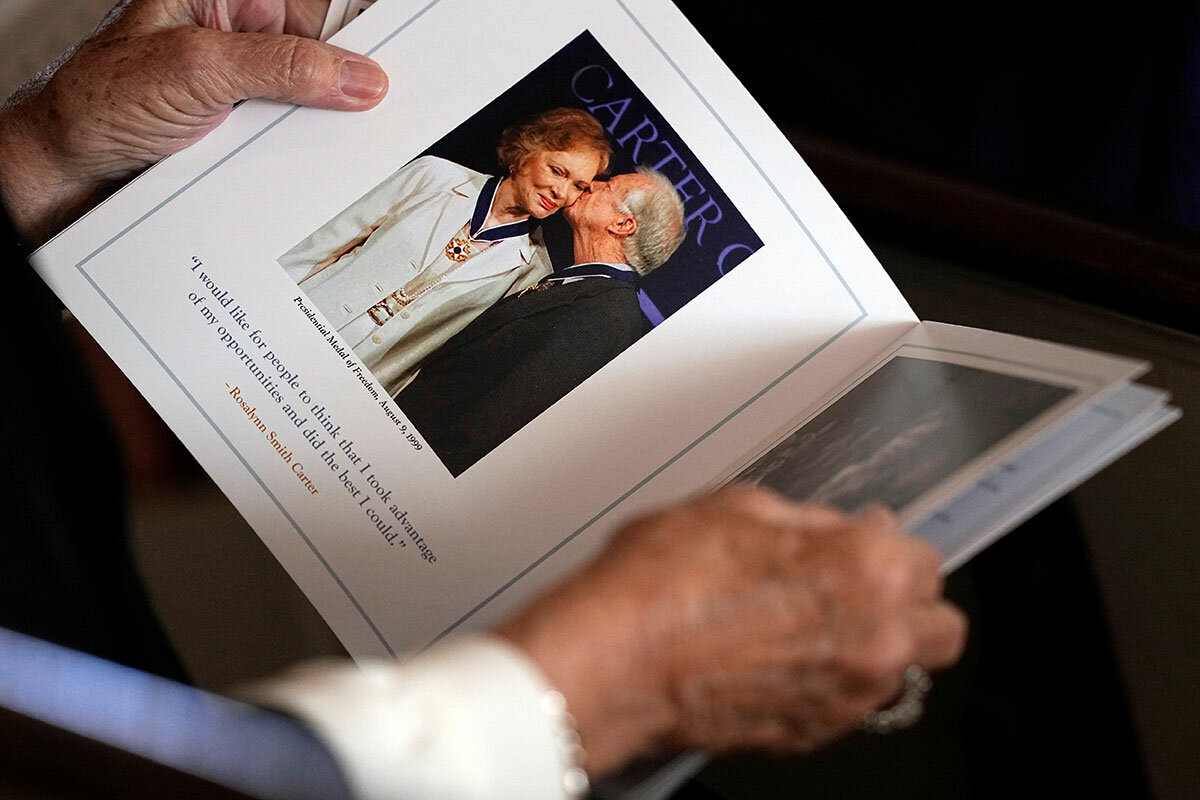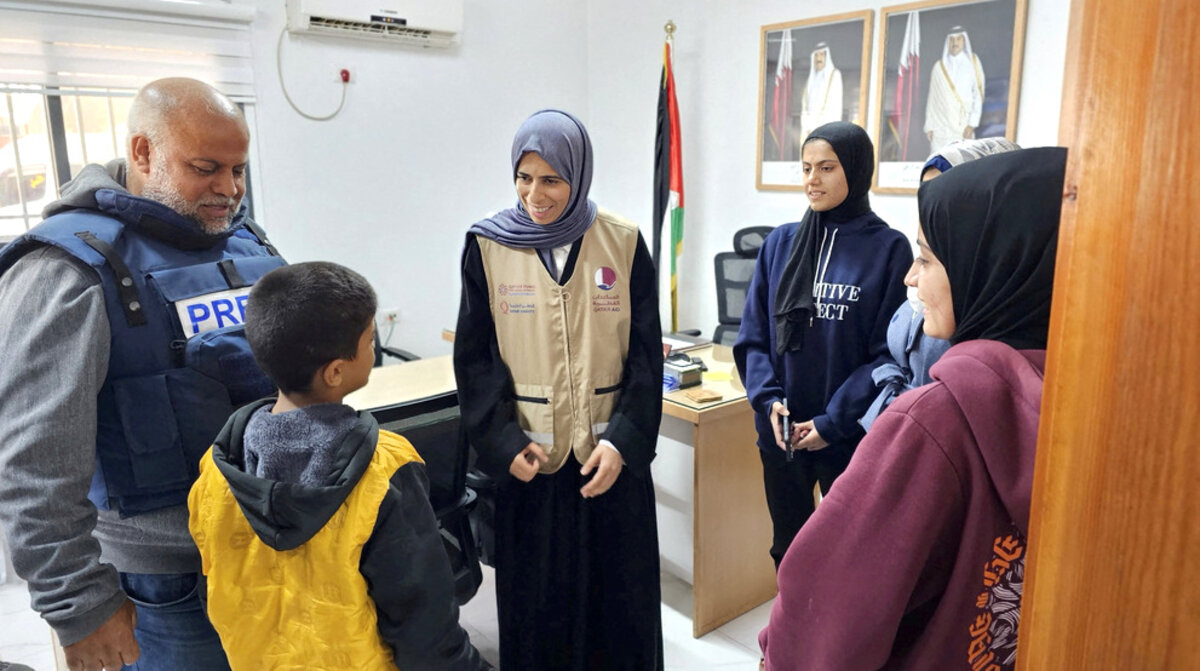Very soon, the Israelis and Palestinians will run out of comparatively easy things to do to keep the pause in fighting going. How the next phase goes will largely be determined by Israel. Hamas has already achieved its goals and more. For Israel, there is pressure to keep pushing.

Why is Christian Science in our name?
Our name is about honesty. The Monitor is owned by The Christian Science Church, and we’ve always been transparent about that.
The Church publishes the Monitor because it sees good journalism as vital to progress in the world. Since 1908, we’ve aimed “to injure no man, but to bless all mankind,” as our founder, Mary Baker Eddy, put it.
Here, you’ll find award-winning journalism not driven by commercial influences – a news organization that takes seriously its mission to uplift the world by seeking solutions and finding reasons for credible hope.
Explore values journalism About usMonitor Daily Podcast
- Follow us:
- Apple Podcasts
- Spotify
- RSS Feed
- Download
 Mark Sappenfield
Mark Sappenfield
IDs were a big deal in the 2020 elections. Should someone need an ID to vote? Do such requirements actually address fraud, or do they depress minority turnout? Lost in the debate was an understanding of how important IDs are for everything from jobs to housing. Can states do better at getting all residents IDs?
It turns out, maybe yes. Colorado has quietly been making headway. Today, we take a look at its innovative mobile program – what benefits it brings and how it could spread. Also, with Israel and Hamas continuing to exchange hostages, we examine the prospects for further progress.
Already a subscriber? Log in
Help fund Monitor journalism for $11/ month
Monitor journalism changes lives because we open that too-small box that most people think they live in. We believe news can and should expand a sense of identity and possibility beyond narrow conventional expectations.
Our work isn't possible without your support.
Today’s stories
And why we wrote them
( 6 min. read )
( 4 min. read )
We appear to be nearing the end of a first phase of the electric car era. Those excited about electric vehicles now have them. The next step is to capture those who are curious but have concerns. That’s not going as well as hoped, leaving industry giants at a crossroads.
( 5 min. read )
How do you live everyday life without an ID – apply for a job, get a bank account, or buy a house? It’s hard, as tens of millions of Americans can attest. But does it have to be that way? Colorado says no, and its roving DMV on wheels is helping residents reconnect with society.
( 5 min. read )
Twenty years ago, Hollywood got it right with two Christmas classics, “Elf” and “Love Actually.” But what is it that sets the best holiday films apart? Yes, redemption and innocence. But another ingredient you might not expect binds the two great eras of Christmas films.
In Pictures
( 2 min. read )
There are many forms of protest, and Lebanese citizens have tried them all. Their efforts to hold an entrenched and corrupt government to account have had soberingly little effect, yet the spirit still shines. Around Beirut, street art hits the eye like a spray-painted howl.
The Monitor's View
( 2 min. read )
Long before the Hamas attack on Israel in early October, the small nation of Qatar was busy overcoming big challenges. Like many other oil-rich Arab countries in the Persian Gulf, it was devising solutions to climate-driven water scarcity, a demographic “youth bulge,” and the prospect of declining oil revenues. Yet Qatar took the time in recent weeks to mediate a humanitarian truce in the Israel-Hamas war. That success, even if temporary, reflects a wider picture of a region trying to lay down markers for peace.
A small but good example was a decision this month by the six states of the Gulf Cooperation Council – Bahrain, Kuwait, Oman, Qatar, Saudi Arabia, and the United Arab Emirates – to offer a unified visa for easy travel between their countries. Such regional cooperation – similar to the European Union’s visa-free travel – builds on last March’s deal between Iran and Saudi Arabia to normalize ties, as well as the 2020 accords that formalized relations between Israel and a number of Arab states.
The region’s most powerful leaders share “a view that their best interests lay in de-escalation and a focus on economic development,” writes John Raine, a senior adviser at the International Institute for Strategic Studies. “Retaining control of their and the region’s agenda is an unstated but implied objective.”
Another example was the Nov. 11-12 emergency summit of the Arab League and the Organization of Islamic Cooperation to discuss the conflict in Gaza. The most noteworthy result was the endorsement of the Palestine Liberation Organization as the legitimate representative of Palestinians – including those in Gaza. Other factions that recognize PLO leadership – meaning Hamas members that adopt peaceful means – could be included.
Gaza has seen multiple wars since 2007. Many in the Middle East now want to use this latest – and largest – war in Gaza to set a different direction for the region. Doing so requires building on triumphs of cooperation.
“If Israel and moderate Arab states can ultimately leverage this crisis for generational good, they could put their region on a more positive and sustainable glide path,” writes Frederick Kempe, president and CEO of the Atlantic Council.
Compared with the Middle East of past decades, today’s Middle East does not lack for bridge-builders, such as Qatar, Oman, Egypt, and Iraq. And wars like those in Gaza and Yemen are only one of the many issues. Leaders that are tackling those other issues – youth joblessness, for example – often end up as peacemakers. Shared interests can lead to shared values.
A Christian Science Perspective
Each weekday, the Monitor includes one clearly labeled religious article offering spiritual insight on contemporary issues, including the news. The publication – in its various forms – is produced for anyone who cares about the progress of the human endeavor around the world and seeks news reported with compassion, intelligence, and an essentially constructive lens. For many, that caring has religious roots. For many, it does not. The Monitor has always embraced both audiences. The Monitor is owned by a church – The First Church of Christ, Scientist, in Boston – whose founder was concerned with both the state of the world and the quality of available news.
( 1 min. read )
As God’s children, we always have it in us to help others – even if we’re feeling stuck ourselves.
Viewfinder
Palestinian children play during the Eid al-Adha holiday, in Gaza City, June 6, 2025.

A look ahead
Thank you for joining us today. Tomorrow we’ll take you to Maine, which is addressing child care needs with a Child Care Business Lab. The idea is to help aspiring child care providers navigate the business landscape and successfully launch their own centers. The result: child care in remote towns and immigrant communities.








